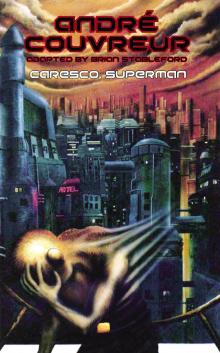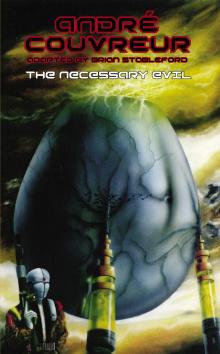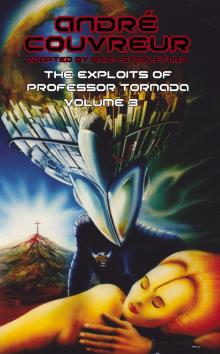- Home
- André Couvreur
The Exploits of Professor Tornada (Vol. 3) Page 13
The Exploits of Professor Tornada (Vol. 3) Read online
Page 13
“My word, one could do osteology on her carcass! Poor microbe, aren’t you getting enough tipple to get drunk, by chance?”
“Milk!” moaned the infant.
Tornada was moved. “Yes…milk...but then, milk…won’t my substratum replace it? And, well, milk...it is really necessary…yes, is it? Oh! I could fit my index-finger into her eye...”
“All the way to the shirt-cuff…,” Théophraste estimated.
Tornada remained meditative for some time. The others respected his silence. They knew that it was significant of an imminent evolution. But in what direction? Anger, pride again, obstinacy in his doctrine? Or pity, humiliation, acceptance of the information he had just received?
Suddenly, Mélanie uttered a scream of both victory and terror. The Superman was hugging Joconde so frenetically that she was struggling to escape a certain asphyxiation. Then it became clear that had had finally surrendering to the reasons of the heart.
When the child was safely back in her mother’s arms, he said: “Right! You have me Nymph. Word of Tornada, it’s promised; it’s sworn. I won’t interfere with humanity any more. It can die at its ease.”
Already repossessed by his fever of discovery, however, he went on: “I’ll even intensify death and render it a little more agreeable. People die stupidly. They die in suffering and terror. It’s time I occupied myself with that. Yes, I’ll transform my theaters, my labs. People will enter them to die rather than to live. That’s it! I shall create…I shall create euthanasia. Eh? Is that apt? What do you think of that word? Euthanasia—doesn’t it ring as pleasantly as Biocolia? Furthermore, while waiting for Uncle Louis, I’m counting on your resuming your functions in my employ, now that I’m working for the Reaper. There’ll be a place for you in Euthanasia...let’s go, quickly—to work!”
He ran away, without saying goodbye.
Oh, the enthusiasm of a people delivered from the idea of life! A torrent of joy ran through Paris, France, and the world, when it became known that Tornada was authorizing passage to the world beyond, that he was even about to facilitate it by means of benevolent inventions, by suppressing anguish and suffering.
“We can die! We can die!” cried delirious people in the streets, greeting people they did not know, congratulating one another, embracing one another.
In truth—the obstinacy of the will to live being so tenacious—everyone, for the disencumbrance of the world, was counting more on the death of his neighbors than his own. And perhaps it would be necessary to force the elimination by drawing lots. Unless the credit balance of life were to be calculated, only taking into account the additional years, the old naturally being called upon to disappear first, provided that political protections did not get mixed up in it...
But it was, even, so a new era, incomparably enchanted. The triumphant Fleur-de-lys had installed a dictator—the Bourbon scrap mentioned by Tornada—and the new government benefited from the human disencumbrance. Many a time, from his window, in inflammatory language, the tyrant celebrated before the blissful people his great friendship with Euthanasia.
Numerous funeral agencies surged forth, which made a fortune in no time. In the cemeteries, the speech-makers at funeral ceremonies, so long out of work, were finally able to let themselves go with a joyful heart and praise the benefits of death before graves florid with immortelles. Notaries emerged from stagnation, settling the affairs of fantastic inheritances.
Confidence was reborn, and profiteers floated alimentary stocks on the market in incredible abundance. Functionaries pullulated, recovering their comfortable idleness. With twenty empty chairs, the Académie became once again the twilight of the old. Theaters and dance-halls reopened. Fashion was not slow to adapt its whimsy to circumstances; it dressed women in long shrouds, made them up with green ingredients, giving them the tints of dead flesh. It coiffed them in black veils, with graciously tragic ribbons—but the rivals of Eve remained attractive nevertheless.
In fact, normal life resumed, thanks to abnormal death.
Chapter X
The Codicil
Two years later, on the eighth of February 1950, at three o’clock in the afternoon, the claimants for the inheritance of the late Louis Lapastille—which is to say, the painter Théophraste Lapastille and Dr. Marcel Granive, each accompanied by his wife—gathered in the office of Maître Gervais, notary, in the Boulevard de Sebastopol. They had been brought by a summons received a month before, notifying them that there was a codicil to the famous testament, and that, in accordance with the wishes of the deceased, the reading of it would take place on that day, which was the day, so long delayed, of the entry into possession of the immense fortune.
Having arrived on time, welcomed with curiosity by the clerks and invited to sit down, the two rival couples pretended not to notice their mutual presence. To put on a brave face, Théophraste had taken a newspaper out of his pocket, but between the text and his eyes, as blue as cornflowers, a cloud extended. Would the codicil be unfavorable to him?
What a surprise, too, to find the Gravines, still arrogant in their youth, the husband stuffing cigarettes from a golden case into his face, his wife applying vermilion to her lips with the aid of her pocket mirror.
In truth, he suspected them of having had the cunning to introduce themselves into Tornada’s domain and having themselves renovated, without being recognized. But now that the era of survival had come to an end, and he, Théophraste, had the role of general administrator in Euthanasia that he had abandoned in Biocolia, he deeply regretted that the enemy household had not deferred its subterfuge until the era when people only went into the sarcophagi to die instead of prolonging their lives. He would gladly have taken away their appetite to possess Uncle Louis’ paintings, he confessed, secretly—without, moreover any element of sentiment that his regret was criminal. Killing was no longer a crime.
Progressively, the office was invaded by journalists in quest of copy. The head clerk attempted to turn them away, but to the professional secrecy he invoked, the intrepid reporters riposted with the freedom of the Press, which had a duty to broadcast the truth of such an important event, from which the power of Tornada had emerged. They were allowed in, and they added to the smoke.
In order to escape their curiosity, making herself as modest as possible, Mélanie started knitting.
Finally, a padded door opened and the notary appeared in the doorway. He was a hundred and ten years old, still youthful in spite of his fidelity to the fashion of wearing side-whiskers on his ferrety face.
He bowed courteously and demanded: “The Lapastille succession, if you please!”
Palpitating, the heirs followed him into a vast study. A long delay in business, combined with the superabundance of mortality, had stacked files from top to bottom along the walls. He did not have to search. He went straight to his safe. He took out a sheet of paper, carefully sealed with red wax, and asked his clients to sit down. The reporters were already filtering in; he pretended not even to notice them.
“Mesdames, Messieurs, we are gathered here for the second time with the objective of occupying ourselves with the testament of Louis Lapastille, deceased in New York. When, forty years ago, hoping never to see you again, I communicated the testament to you, as well as its prorogation, it was forbidden to me by the testator to reveal to you at that time that a codicil existed. It was my presumable successor who was to make it known to the living heirs at today’s date, having summoned them a month in advance by registered letter and by way of notices in the press. The circumstances are such that, contrary to all anticipation, we find one another in full health and strength, and that I am able to execute strictly the measures prescribed by the aforementioned Louis Lapastille. I have therefore summoned you individually and I place before your eyes the advertisement placed in the press a month ago...”
He offered a newspaper, which no one consulted. Stroking one of his side-whiskers, he continued.
“Also contrary to all expectation, the fo
rtune of the late Louis Lapastille, having remained under the protection of the master of our destinies, has escaped social appropriation and remains intact in the fortress of Brow City, where it was originally deposited. I have, in consequence, arranged with a solicitor over there that today, for the first time, taking account of the time difference between the two countries, for the seals to be lifted, a rigorous inventory of the movable and immovable property carried out and a radio message sent to me, indicating, for transmission to you, the approximate value of the immense fortune. Let us hope that time will have done no harm to the conservation of the collections, notable the paintings by old masters that make up its principal value...”
“The only thing that interests me,” Théophraste agreed. “The nuggets, the jewels, I don’t care about, but learning that the paintings are mildewed would be a catastrophe!”
“A reparable one…” reflected Marcel Granive, aloud. He was still coveting his share of the booty. For him, art had no interest except for its mercantile value. The shares, bonds and the magnificent gold were more resplendent in his eyes. A glint of cupidity was blazing in his orbits
Fearing that the blaze in question might attract an acerbic response from his rival, Maître Gervais hastened to announce: “Mesdames, Messieurs, I’m opening the codicil...”
It was perhaps the first time in History that a simple text was to reveal instantaneously a new master of the Earth, so the notary’s hand trembled slightly as it introduced the paper-knife into the envelope, and one might have heard the heartbeats of the members of the audience—including the reporters, who had been joined by two photographers.
“And this is what it contains, Mesdames et Messieurs. I shall read it word for word...”
But he did not read anything at all. Amazement blocked his throat and caused his side-whiskers to bristle. He let the piece of paper fall on to his desk.
Théophraste took possession of it, and he was the one who revealed the impressive prose, in an astonishingly calm voice.
Of my dear heirs, I, Louis Lapastille, on the point of rendering my soul, but nevertheless quite lucid, ask this:
What would they think of an orphan who, after having received nothing from his family but blows throughout his youth, consecrated his life to business in order to enrich his malevolent relatives?
They would think that the gentleman in question was mad, or, in popular parlance, a sausage.
My dear relatives of the Lapastille and Granive families, your Uncle Louis is not a sausage.
I have made a great deal of money in the U.S.A. but not to give it to the children of my tyrants.
No. I have squandered madly all that I have earned. There is nothing left. When my chests of nuggets are opened, only pebbles will be found. When my jewels are valued, it will be seen that they are paste. When my paintings are examined, they will be recognized as poor copies. None are authentic apart from the daubs of a certain Théophraste Lapastille, which I have monopolized at a hundred francs each—which is to say, ten times their value—because I learned that the dauber was a member of my family...
“So that’s why so much of my work was bought for America!” Théophraste interjected, who received a shock even so. Nevertheless, he went on calmly.
In sum, my dear relatives of the Lapastille and Granive families, my inheritance is nothing but an enormous hoax, what is called in Marseilles a galéjade. I have delayed the settlement in order in order to acquaint you better with the weight of a disappointed illusion. Realized in francs, there is not sufficient left to pay the fees of the lawyer who is reading me at this moment...
It was Maître Gervais’ turn to grimace. The journalists laughed surreptitiously. Théophraste concluded his reading.
As for the palace that encloses my treasures, on which I have taken care to take out a huge mortgage, I make a gift of it, for the present, to the stray cats of New York.
With that, my dear relatives of the Lapastille and Granive families, I send you all to the Devil!
Strident laughter, emerging from behind the reporters, revealed that the Devil had responded to the summons. Théophraste screwed up the testament into a ball and threw it in his face.
“You know, old Nada, the paintings apart, I don’t really care. I’d have had so many annoyances placing all that money!”
“How right you are, old Phraste! For the true wealth is in work! Granive knows something about that, being so poor, so utterly poor, in his idleness, and who is pulling a face as long as the notary’s! Just look at the long face of that bandit Granive…and the scowl of his worthy companion Carmen!”
He sobered up suddenly. “In fact, this immoral story of inheritance, which is reminiscent of the strong-box of a certain Thérèse,16 has a moral even so. It’s that the vastest upheavals can derive from the most trivial occurrences, and even from a stupid joke. Would I ever have thought of prolonging life if I hadn’t believed in that treasure myself? If, in order to dispossess that thief Granive, I hadn’t wanted to make Théophraste Lapastille survive, in order that he might remain the sole heir? Furthermore, on observing the social results of an excess of survival, would I have researched the gentlest death, so much in favor since I’ve created Euthanasia? Death! Death, a domain, for the scientist much vaster and much more interesting than ephemeral life! An unknown more formidable than those of the Ocean or the infinite Ether! What science will reveal the secret of death, if not physiology, as long as it escapes the donkeys of the Institut and is at the service of a scientist…a scientist like me?”
At that moment, to support his prediction, a fortuitous flash of magnesium lit up the room, bringing out the relief of the bones of his sardonic visage, the undulation of his long fur and the excess of his tics. But his eyelids did not quiver. The eagle can look the sun in the face.
He turned to the reporters and said, prophetically:
“Listen, all of you gleaners! And take note of this date, the eighth of February 1950, at three o’clock in the afternoon! A man…a Superman…me…Tornada…I announce solemnly to the Universe that I have just discovered the purely physiological nature of the soul! And that before long, I shall unveil something enormous, which will bring back tranquility to this base world! Is that understood? Is that noted down? Yes? Let’s get going, then, old Phraste.”
What was he preparing?
Fear was inscribed on every face. They had had too much recent and cruel experience of the scientific benefits of Professor Tornada...
THE CASE OF BARONNE SASOITSU
Chapter I
“Hurry up, my dear Abro.”
“Just a second. The eyelashes aren’t quite as I’d like them.”
“Come on! Come on!”
Baronne Betty Sasoitsu was allowing herself to be made up for the reception that she and her husband, the wealthy director of the safest bank in Tokyo, were giving at their luxurious town house in the Avenue de l’Alma. Skillful make-up would impose her beauty even more on the admiration of the Parisian elite of socialites, diplomats, sports stars, artists and even a few scientists, who would attend the masquerade on that carnival night—for the event would be costumed and masked. The ladies would be free to leave their faces uncovered provided that their head-dress matched the obligatory kimono. For the supposedly stronger sex, however, the mask, left to the choice of a disguise evocative of the past of the great island, was compulsory. That promises some amusing mistakes.
Anyone not familiar with the house would have been astonished to see the Baronne’s make-up artist dressed in a French suit. A frock-coat is not the customary outfit of artisans of esthetics, but Abrovici was a member of staff. Manning the cloakroom that evening, in charge of collecting and numbering the furs necessitated by a rigorous winter, it was necessary for him to wear a suit. They would have been equally astonished to hear the Baronne address him as tu and call him “Abro,” indicating a familiarity all the more surprising because he was afflicted with a repulsive face, avid eyes, a sharp nose and a flattened jaw, exa
sperated by a large dark red birthmark on his left cheek—but Abrovici had a past that commanded his mistress not to treat him imperiously.
A Rumanian subject dogged by bad luck, he had fetched up in Paris, attempting to make his fortune in Montparnasse as an Impressionist painter. Everyone knows the disillusionments to which art leads in these wretched times. Quickly disappointed, the immigrant sought another employment that would allow him to eat. His hideousness led to his engagement by a cinema studio at Saint-Cloud. From there he migrated to Hollywood, where, willing to do anything, he had sometimes been used to operate a camera, sometimes to make up the actors and sometimes to drive cars. It was in that exile that he attracted the compassion of the woman who, before becoming Baronne Sasoitsu, had been the world famous star Betty Toxfellow. Then again, he was known to be a good fellow without a grain of ill-will, which, Betty willingly declared, had led her to hire him, and then to bring him back to Paris, in the capacity of her personal chauffeur.
“Don’t make me up as if for the screen,” she instructed him. “We don’t have to be checked out by the director this time. Remember how he swore when you tried out your impressionism on me?”
“Madame la Baronne can be reassured,” said Abrovici, who had not lost the habit of deference in his own parlance.
The evocation of Hollywood, however, caused them to exchange a smile. In the dressing-table mirror, Betty’s delightful denture was resplendent. She delighted herself by prolonging the gleam, mouth open.
The man selected another sachet of lightly-tinted powder from the kit, and caressed his mistress’ face with it. His stout fingers manipulated a powder-puff as surely as a steering-wheel.
“There—it’s finished.”

 Caresco, Superman
Caresco, Superman The Exploits of Professor Tornada (Vol. 2)
The Exploits of Professor Tornada (Vol. 2) The Necessary Evil
The Necessary Evil The Exploits of Professor Tornada (Vol. 3)
The Exploits of Professor Tornada (Vol. 3)